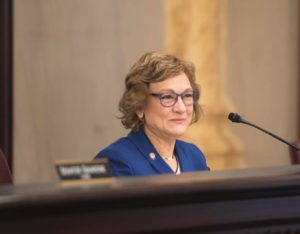Ohio Republicans look to restrict transgender bathroom use in schools, colleges
(The Center Square) – A group of Ohio Republican House members recently introduced legislation that would ban Ohio students from using restrooms or locker rooms of the opposite biological…

(The Center Square) – A group of Ohio Republican House members recently introduced legislation that would ban Ohio students from using restrooms or locker rooms of the opposite biological sex.
Sponsored by Reps. Beth Lear, R-Galena, and Adam Bird, R-New Richmond, House Bill 183 would require schools and colleges to clearly designate separate bathrooms, locker rooms and shower rooms for “exclusive use” by students of the male and female biological sexes.
Additionally, the legislation would prohibit students of the male biological sex from using female-designated facilities and students of the female biological sex from using male-designated facilities. It would also prohibit members of the opposite biological sex from sharing overnight accommodations.
The bill’s language defines “biological sex” as “the condition of being either female or male, and the sex listed on a person’s official birth record.”
Schools and colleges could still provide single-use facilities or “controlled use of faculty facilities” for special circumstances. The bill’s restrictions would not affect children under 10 years old or people with disabilities being helped by a family member.
Since its introduction May 23, HB 183 has gained support from 19 Republican cosponsors. The bill is expected to be assigned to a committee next week.
Some have labeled the legislation as “unconstitutional,” “anti-trans,” and “hateful rhetoric,” but the bill’s sponsors say the intent is to protect vulnerable students.
Bird told the Center Square the purpose is to ensure the privacy and safety of Ohio’s women and girls.
“When a woman or a girl enters a restroom, they have an expectation of peace, safety and privacy,” he said.
Bird also said school officials across Ohio have expressed concern about students’ safety and have asked for consistency in bathroom guideline policies.
“It’s a consistent step for me and for our caucus to pass a bill in this direction,” Bird said. “This is a compassionate bill that cares for our young ladies. I feel like this is the right bill at the right time.”
House Minority Leader Allison Russo told the Center Square in a statement she sees H.B. 183 as a distraction from other issues facing Ohio.
“Instead of bathroom battles, our time and resources would be much better spent addressing the real issues that directly impact the health and safety of Ohio’s children: poverty, hunger, gun violence and mental health,” she said. “Tackling these issues rather than waging constant culture wars against LGBTQ+ youth might actually make this state more family-friendly and a place where all children can thrive.”
HB 183 is the first bill Ohio lawmakers have introduced to restrict the use of bathrooms and other facilities in accordance with gender identity. However, Ohio entered the nationwide conversation on bathrooms and gender identity last year when parents from a Dayton-area school district filed a federal lawsuit after a transgender student began using a middle school female bathroom.
Ohio Attorney General David Yost released an advisory opinion last week stating that state anti-discrimination laws and the 2020 Supreme Court ruling in Bostock v. Clayton County would not prevent institutions from designating single-sex bathrooms.
Yost highlighted in his letter that failing to preserve separate, biological sex-based facilities could put women and girls at risk and that sex-segregated bathrooms are an “expected and unsurprising aspect of American life.” He said, “Perhaps because the wisdom of providing separate private spaces for women is so intuitive, sex-segregated bathrooms have not sparked much litigation or concern.”



